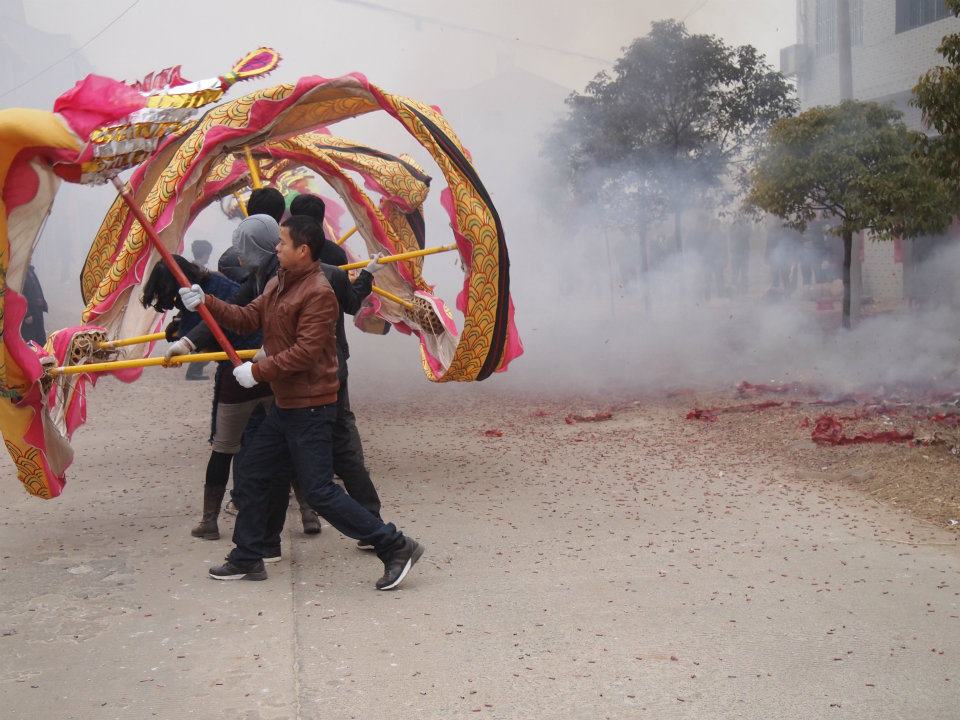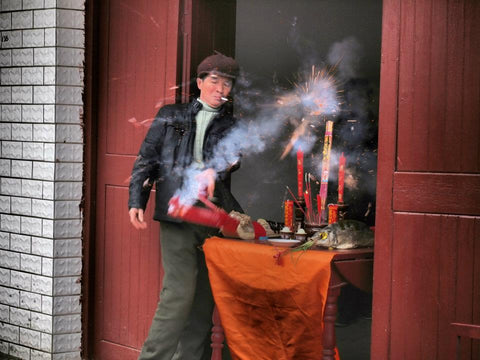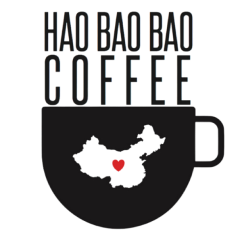
Bang, Soot, Plop! Lessons from Our First Chinese New Year

“It’s THE golden ticket. Never turn it down!”
We had just moved to Wuhan, China and our new expat community was welcoming us greenhorns with lots of advice...everything from “always bring toilet paper” to “say ‘bu la’ (not spicy) when ordering” (we learned quickly that these two tips were lifesavers since there’s no toilet paper in public restrooms and saying “not spicy” takes the heat down from blazin’ to just plain HOT!). But after more than a few newly-found foreign friends told us to never turn down an invitation from a local friend to visit their village, we got the point.
Our first Chinese New Year approached a few months later and we were giddy with excitement that a sweet Chinese teacher at our school asked us if we’d like to travel out to her village, only about one-hour outside of Wuhan. We probably scared her with our eagerness, however she diligently wrote down all the directions from our home to hers...and in Chinese AND English. We were a little nervous about the taxi to a bus and then another bus route, but thrilled to get out of the bustle of this metropolis and experience life in the countryside.
What we thought would be a simple trip became challenging at the first bus station...not because we couldn’t find the bus, but because the bus driver wouldn’t let us on! It finally dawned on us that our friend wrote the directions in Chinese for us to show others that we, seemingly misplaced foreigners, truly did want to get on this bus. Bingo! He finally opened the bus door as we gratefully sighed in relief.
After what felt like planes, trains, and automobiles, we arrived to our friend’s village and were so graciously welcomed by her family. Although her village was only a short distance outside of one of the biggest and most modern cities in China, it had no running water, electricity, heat/air, or other “modern” conveniences. There were nice cars parked in the driveways and everyone had a cell phone, however all the windows were opened for ventilation (even though it was below freezing outside) and our friend’s mother was cooking over a fire in an “open” kitchen behind the house. But was most surprising to our Western minds was the village bathrooms...two holes in the ground of a “field” centrally located with half a brick wall enclosing them. No “Men” and “Women” signs either, but everyone else seemed to know which side to use. Our minds struggled to comprehend the vast differences between the living conditions in our city so close by and this rural village while our friend’s mother so generously dished out home-made jiaozi (dumplings) in warm broth. While she had never met us before and our communication was mostly through hand signals, she was so willing to share her delicious handiwork with us.

After our bellies were warmed and filled, we joined the noisy caravan going house to house, cheerfully waving an iridescent dragon between numerous dancers and igniting the loudest firecrackers we’d ever heard to chase away the evil spirits, as well as banging on anything that could possibly be made into a drum. This boisterous procession went on for what felt like hours, with dancers and drummers switching in and out for breaks. We were so honored to be invited to wave the dragon’s body and even held the head (the highest honor), as well as clamor with musicians. And of course, we got a photo shoot with every baby in the village willing, (or not-so-willing!) to take a picture with us strange-looking foreigners! Although our arms were tired and our ears hurt from hours of “bang! Bang! BANG!” we were truly in shock by how multi-sensory this Chinese holiday is...right down to feeling the soot on our faces from close proximity to the firecrackers! And you better believe we went “plop!” as we sunk down into the bus seats that evening, legs exhausted from participating in only a few short hours of this stunning celebration!

A few key lessons we learned from this sensory-laden day...
1.Strangers tried to help us foreigners, even before we asked.
As we stood at the door to the first bus leaving Wuhan, knocking on the door but the bus driver not opening it, I was fuming. “How dare he not let us on!” I seethed. Then it hit me...he’s trying to look out for us! He knows no other foreigners go out this way, so he’s trying to make sure we don’t get lost! This happened again and again during our two years in Wuhan. Even if we didn’t ask for help, local people would be so gracious to try to assist us, knowing we definitely weren’t from there.
After moving back to America, I’ve become more aware of the “foreigners” around me. But how often do I stop what I’m doing and lend them a hand? Sometimes I can’t communicate directly with them, but even a little smile, door held, or point in what I hope is the right direction might touch their hearts just as ours were.

2. Our Chinese friends were so eager to invite us into their holidays and lives.
This dear teacher could have left us crazy foreigners back in the city and enjoy some special family time with relatives she only sees once a year. However, she decided to welcome us into her world, one she knew we were dying to experience but only could with a special invitation. Her village invited us to wave the dragon’s tale (although I’m sure we messed up the rhythm of the dance) and my friend patiently and loudly explained what each part of the celebration represented above all the clanging. This was their special day, yet this sweet village went out of their way to make us feel a special part of it.
Since relocating to the States, I’ve loved being able to celebrate the holidays with my family, indulging in all the American traditions and starting some of our family’s own. But am I willing to open my home up, sharing my family’s Thanksgiving feast or Christmas rituals with someone far from home or interested in how we Americans celebrate?

3. Those who have “little” in our eyes humbled us by their overwhelming generosity.
As many other foreigners in China and around the world can attest, usually you find the most heart-felt hospitality in the simplest of places. In our eyes, there was so much “lacking” in this village’s living conditions, however they showered us with their food, time, and care. Our friend’s family treated us like royalty, encouraging us to devour the carefully made dumplings her mother probably spent all morning making. My friend spent the time to carefully explain each tradition and translate conversation after conversation for us. The whole village made sure we were able to participate in all aspects of the day’s festivities, even giving up their place on the dragon or drum in the chorus so we could participate.
A big adjustment for us after returning to America was the striking differences in generosity between cultures. In the hustle and bustle of American life, I find myself personally being stingy with my time and resources. Sure, I don’t mind donating a dollar here or there for a good cause, but opening up my home to the lonely? Spending my valuable time serving others? Choosing to care about those different from me instead of bubble-wrapping myself up and hiding behind my white-picket fence? I have so much to learn from those hospitable villagers, so generously inviting us into their homes and very lives.

We went to our friend’s village that day, eager to learn about a foreign holiday, but instead learned that we foreigners have so much to glean from these precious people beyond how they celebrate a special day. Although our ears hurt from all the banging and it took a few showers to get out all the soot, our hearts as we plopped down on the bus ride home were ever so grateful for this life-changing experience.



